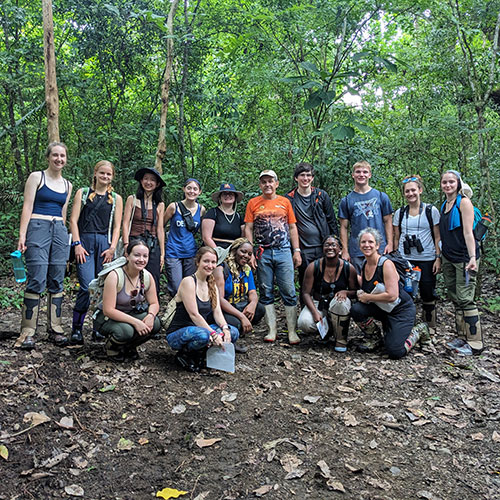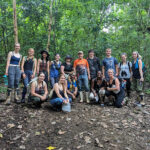
Students explore the effects of land-use decisions on both humans and wildlife during Costa Rica TREK

Laura Sirot, professor of biology, and Brooke Krause, associate professor of economics and global & international studies, led 13 students from The College of Wooster on a three-week TREK program to Costa Rica in summer 2023. Through cross-disciplinary collaboration, students learned about efforts to conserve and restore wildlife populations and participated in a community development project that benefited a local elementary school.
The program grew out of a relationship Sirot had built with Rescate Wildlife Rescue Center, which rehabilitates injured, sick, and confiscated animals and releases them back into the wild when possible. Sirot, whose research focuses on animal behavior, had partnered with Rescate in the past and recognized an opportunity to support the nonprofit organization while giving Wooster students an unforgettable experiential learning opportunity. She decided to reach out to her colleagues at Wooster to see if anyone was interested in an interdisciplinary collaboration, and when Krause responded, it seemed like the perfect fit.
“We had the incredible opportunity to go on a scouting trip. I had been to Costa Rica probably 20 times, but I saw it completely differently through her eyes,” Sirot said. “Seeing it through an economist’s perspective changed the nature of the project and expanded it beyond animal rescue.”
The students began their journey by meeting with Rescate staff at their sanctuary in Alajuela and learning about their work. They then spent two weeks in a small community called Pilas de Canjel, which is close to one of the center’s release sites. Rescate was interested in strengthening the relationship with the local community.
“The release site was established more than 30 years ago, and at that time there was a lot of killing and capturing of wildlife all over Costa Rica, including in that area,” said Krause, who was trained as a development economist. “Rescate was very protective of the animals they were releasing there, but at the same time, the local community had been using that land as a source for water and an important social and cultural space.”
Sirot and Krause wanted to help strengthen the relationship. During their scouting trip, they had spoken with local leaders about potential collaborations and identified the need for a new roof for an outdoor space at the elementary school. Rescate staff took the lead on the project, from taking measurements and designing the roof to purchasing the materials and leading the actual construction. The students helped by painting steel beams, mixing concrete, and laying concrete blocks, among other tasks. During the process, the team identified the need for a small retaining wall to prevent mud from entering the classrooms, and the students helped build that as well. After discovering there were enough leftover materials to complete another project, the team consulted with the school director and town mayor and decided to build a bus stop for the middle and high school students, who previously waited for the bus in an uncovered area.
“The program made me realize that conservation is a full-time job. The people who are working to maintain parklands, feed rehabilitated animals, track population movements, and do everything else needed to keep the environment thriving do not always have time to interact with the community. There can be a divide because of this,” said Ethan Bardoe ’26, who plans to double major in environmental studies and economics. “This trip helped me realize how narrow-minded it is to only think about ‘nature’ in conservation policy without thinking about how to work with people.”
During their stay at Pilas de Canjel, the students had the opportunity to visit with a marine conservation organization. They learned about conservation efforts for both sea turtles and sharks, as well as how these conservation efforts must involve local communities in order to be successful. They were presented with several examples of conflicts that could only be resolved by including the needs of both the humans and wildlife living in the area.
The students then traveled down the Pacific coast, staying for several nights near Manuel Antonio National Park. There, they toured the popular park and considered the differences in the behavior of the animals they observed in the more undisturbed habitat of the release site compared to that of those in the heavily-visited park. They also ventured out with a coral conservation organization and were given the opportunity to do hands-on work creating coral reef nurseries. Finally, on the way back to Alajuela, the group stopped at a sustainable cacao farm, where they got a tour and made their own chocolate straight from the beans. Throughout their trip, students had the opportunity to engage in deep thinking about conservation efforts and land use and what they mean for both wildlife and humans.
“The program helped me understand how difficult conservation can be, as well as how important it is,” said Zoë Jurkowski ’24. “As an environmental studies major, I have always learned of conservation efforts, but the chance to witness and learn from a specific program as well as live in the areas they were trying to conserve added a completely different perspective to what I had learned thus far. Whether it is creatively, academically, or personally, I have endless curiosity and reverence for the world around us, and I am glad to have had an experience that affirmed my feelings and interests.”
Posted in Experiential Learning on January 12, 2024.
Related Posts
Related Areas of Study
Global & International Studies
Economics, history, and political science courses with a global and international perspective
MajorEnvironmental Studies
Natural sciences, social sciences, and humanities courses combine for those who want to be part of environmental solutions
Major MinorEconomics
Learn how humans organize to sustain life and enhance its quality from a diversity of economic perspectives
Major MinorBusiness Economics
Learn how economics and quantitative methods can be applied to contemporary problems in finance, management, and business with expert faculty mentors in a diverse department
MajorInternational Business Economics
A minor for language majors who want to add an international business perspective to their studies
Minor

